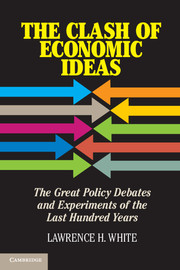Book contents
- Frontmatter
- Contents
- Figures
- Acknowledgments
- Introduction
- 1 The Turn Away from Laissez-Faire
- 2 The Bolshevik Revolution and the Socialist Calculation Debate
- 3 The Roaring Twenties and Austrian Business Cycle Theory
- 4 The New Deal and Institutionalist Economics
- 5 The Great Depression and Keynes’s General Theory
- 6 The Second World War and Hayek’s Road to Serfdom
- 7 Postwar British Socialism and the Fabian Society
- 8 The Mont Pelerin Society and the Rebirth of Smithian Economics
- 9 The Postwar German “Wonder Economy” and Ordoliberalism
- 10 Indian Planning and Development Economics
- 11 Bretton Woods and International Monetary Thought
- 12 The Great Inflation and Monetarism
- 13 The Growth of Government
- 14 Free Trade, Protectionism, and Trade Deficits
- 15 From Pleasant Deficit Spending to Unpleasant Sovereign Debt Crisis
- Index
- References
15 - From Pleasant Deficit Spending to Unpleasant Sovereign Debt Crisis
Published online by Cambridge University Press: 05 June 2012
- Frontmatter
- Contents
- Figures
- Acknowledgments
- Introduction
- 1 The Turn Away from Laissez-Faire
- 2 The Bolshevik Revolution and the Socialist Calculation Debate
- 3 The Roaring Twenties and Austrian Business Cycle Theory
- 4 The New Deal and Institutionalist Economics
- 5 The Great Depression and Keynes’s General Theory
- 6 The Second World War and Hayek’s Road to Serfdom
- 7 Postwar British Socialism and the Fabian Society
- 8 The Mont Pelerin Society and the Rebirth of Smithian Economics
- 9 The Postwar German “Wonder Economy” and Ordoliberalism
- 10 Indian Planning and Development Economics
- 11 Bretton Woods and International Monetary Thought
- 12 The Great Inflation and Monetarism
- 13 The Growth of Government
- 14 Free Trade, Protectionism, and Trade Deficits
- 15 From Pleasant Deficit Spending to Unpleasant Sovereign Debt Crisis
- Index
- References
Summary
In November 2010, the economist George S. Tavlas of the Bank of Greece rose to speak at a monetary policy conference being held in Washington, D.C. He began his presentation by remarking dryly: “It’s a pleasure to be in the United States again, which more than ever feels like being at home.” He paused. As they got the joke, members of the audience laughed– a bit nervously. To make sure that nobody missed his meaning, Tavlas continued: “It’s not often that I get to travel to a country that has fiscal deficits that remind me of those of Greece.”
SOVEREIGN DEBT CRISES HIT GREECE AND IRELAND
A sovereign debt crisis hit Greece in fall 2009. With its current budget deficit running above 13 percent of GDP and its accumulated debt rising to 113 percent of GDP, Greek government bonds fell to “junk bond” status. In April 2010 the market yield on two-year Greek government bonds rose above 12 percent, reflecting the market’s perception of a high probability of default. At such high borrowing rates, Greek taxpayers faced a debt trap. When a government rolls over its debt at interest rates above the economy’s growth rate, the debt compounds faster than GDP merely from debt service, making the debt-to-GDP ratio grow ever higher, the default premium in the interest rate on borrowings rise ever higher, and debt service consume ever more of GDP. Unless budget deficits are trimmed until the deficit as a percentage of GDP no longer exceeds the GDP growth rate, or large gifts arrive from outside, repayment in full becomes impossible.
- Type
- Chapter
- Information
- The Clash of Economic IdeasThe Great Policy Debates and Experiments of the Last Hundred Years, pp. 382 - 412Publisher: Cambridge University PressPrint publication year: 2012



